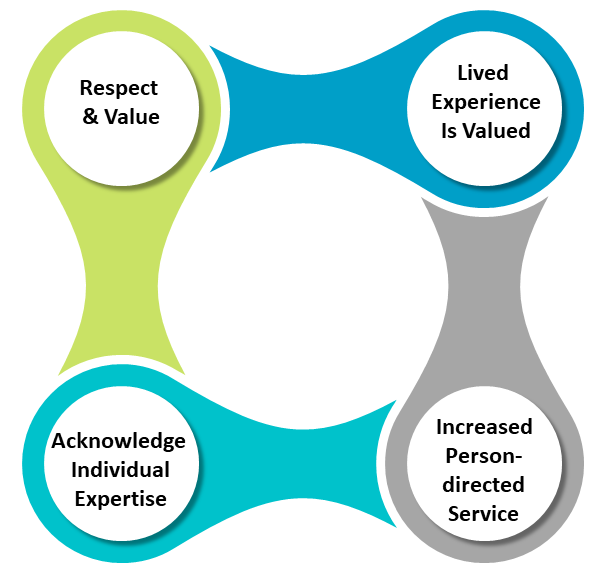Workplace Culture
Workplace culture reflects the values, attitudes, beliefs and work practices of management and employees. A culture which values personal lived experience and considers it essential allows Lived and Living Experience roles to be meaningfully embedded, and is therefore key to success.
The Importance of Culture
Respecting and valuing Lived and Living Experience roles fosters a culture where lived experience perspectives are valued, including the perspectives of people accessing services. This value then leads to more person-directed service design. Person-directed service acknowledges that the expertise an individual has and the guidance they can bring to their own life and mental wellbeing and/or that of their friend, family member or significant other.

While many people who are not in designated Lived Experience roles also have a personal lived experience, disclosure is rare in the mental health sector and sharing lived experience can have negative impacts for workers in non-designated lived experience roles.
Lived Experience roles can promote a workplace culture where it is safe for non-designated workers to disclose and be accepted by colleagues and supervisors. There are a number of ways this can be done, including:
Lived Experience-run and designed, or co-designed training which covers identifying with lived experience and/or disclosure
Lived Experience-led training to help people in non-Lived Experience roles to learn how to use their lived experience in an effective and suitable way
Embedding Lived Experience perspectives into human resources practices to co-create a workplace where it is safe to disclose
When training is implemented, care should be taken to make sure it is effective. Effective training:
Increases understanding of Lived Experience work
Encourages genuine collaboration
Enlists management support and commitment
Makes a philosophical commitment to Lived Experience workforce development
Importantly, this training needs to be included from orientation on, for all staff, and run periodically. These messages need to be repeated regularly for meaningful change to workplace culture and attitudes.
Effective training will:
Explicitly highlight the connection between personal recovery, person-directed service delivery and Lived Experience work
Be ongoing and revisited, not a once-off
Include Lived Experience leaders to deliver training on lived experience concepts and practice
Highlight the benefit of Lived Experience roles to service users/their families and significant others, colleagues and organisations
Cultural barriers for Lived Experience Roles in Traditional Work Environments
The dominance of biomedical approaches can clash for Lived Experience ways of working. Likewise ‘corporate values’ within some organisations, particularly in executive management, can adversely impact people in Lived Experience roles.
Lived Experience workers are unique in their ability to create more ‘natural’ relationships, with high relatability for service users. This is a key benefit for the organisations they work for and for service users. However, the prevalence and dominance of traditional values within some organisations can make Lived Experience workers feel isolated, leading to negative impacts and reduced effectiveness.
Genuinely inclusive organisational culture considers these potential impacts on Lived Experience workers.

Lived Experience Training
Check out our website with courses to embed the research findings and build strong understanding of Lived and Living Experience workforces and practice.
